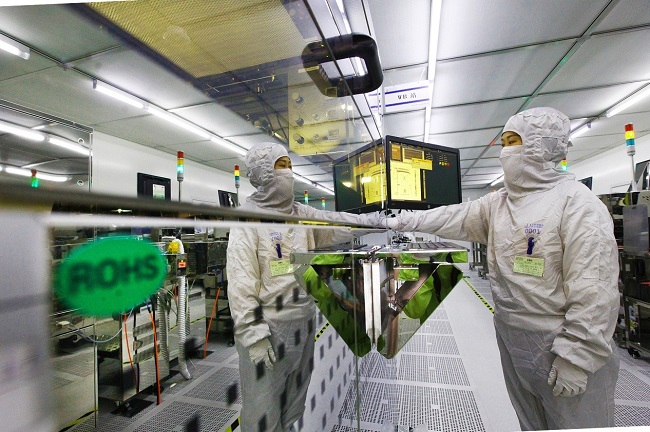
A technician tests electronic products in a dust-free workshop of Anhui Lite Array Co., Ltd. in Feidong Economic Development Zone in Feidong county, Hefei city, Anhui province in east China on May 29. (Photo by Wang Wensheng/People’s Daily Online)
A China-Europe freight train fully loaded with 41 carriages of clothes, footwear, hats, mechanical equipment, plastic granulate, and anti-epidemic medical supplies recently departed from Xinzhu Station of Xi’an, capital of northwest China’s Shaanxi province, for Hamburg, Germany.
With the help of multimodal transport, the Chinese commodities have eventually entered a vast market in Europe.
China has made all-out efforts to recover its exports amid the continuous efforts to prevent and control the COVID-19 disease, by introducing a series of preferential policies and encouraging its enterprises to explore new markets.
Thanks to these measures, China’s trade in goods has begun to recover. In April, the value of exported goods totaled 1.41 trillion yuan ($199.1 billion), up by 8.2 percent on a yearly basis, while that in May rose 1.4 percent year on year to 1.46 trillion yuan, according to the General Administration of Customs (GAC). These figures stand as a contrast to the dro in the data in the first quarter of the year.
The rebound demonstrates that the fundamentals of China’s foreign trade remain unchanged.
Qingdao Sanshuo Health Industry Development Co., Ltd., a sporting goods company in east China’s Shandong province, has fully recovered production.
The company has attracted many new European customers since April, and seen its orders signed till July, according to Yang Liyun, director of the international department of the company.
In the medium and long term, the fundamentals sustaining the sound development of China’s foreign trade remain unchanged.
Since the beginning of this year, all local governments and relevant departments rolled out measures to facilitate resumption of production and work, in a bid to secure foreign trade.
A total of 297,000 enterprises across the country had import or export activities in March, an increase of 53.4 percent compared to February, says the GAC.
The recovery in exports also signaled the improvement in the competitiveness of the companies.
“We have almost worked overtime every day since resumption of work,” said Pan Yanjun, president of Dingkang Science and Technology Co., Ltd. in east China’s Zhejiang province.
Pan thinks the success of securing orders can be largely attributed to the company’s efforts in innovation, research and development. Through the continuous efforts in developing intelligent applications, the company aims to expand its presence in the market.
In recent years, China’s foreign trade companies have worked faster to bring in talents, upgrade technology and develop new products, gaining an edge over their international competitors.
Amid the ongoing efforts of epidemic prevention, foreign trade companies accelerated their pace of upgrading and improvement to better ward off risks in the market.
According to GAC statistics, export of electro-mechanical products in the first five months of the year registered 3.64 trillion yuan, among which the export of automatic data processing equipment and its components increased 1.8 percent year on year to 508.61 billion yuan.
The sound momentum in export also arises from the strong support the strategy of market diversification offers for export.
A few days ago, more than ten tons of pesticides produced by Hebei Veyong Bio-Chemical Co., Ltd in north China’s Hebei province were transported to the port city Shanghai. The pesticides, whose final destination is Pakistan, would help the country cope with its locust plague.
“Standing at $24 million, our export in the first quarter of the year increased 16 percent year on year,” introduced Yang Jianhui, deputy manager of the international department of the company.
Chinese foreign trade companies have diversified their export markets and explored emerging markets such as countries along the Belt and Road, seeing more exciting opportunities for foreign trade.
The value of imports and exports between China and countries and regions along the Belt and Road in the first four months of the year reached 2.76 trillion yuan, representing a year-on-year increase of 0.9 percent.
In the foreseeable future, China’s foreign trade still faces severe challenges of shrinking international markets and disrupted industrial and supply chains. That being said, Chinese enterprises have strong resilience and huge potential, as they have weathered the hardships in the international markets.
In general, China’s export firms have an acute sense of innovation, stable industrial and supply chains, and made remarkable progress in exploring emerging markets. Besides, policies to ensure stable foreign trade are being implemented and bearing fruits. All these have created conditions for further recovery of China’s foreign trade.

